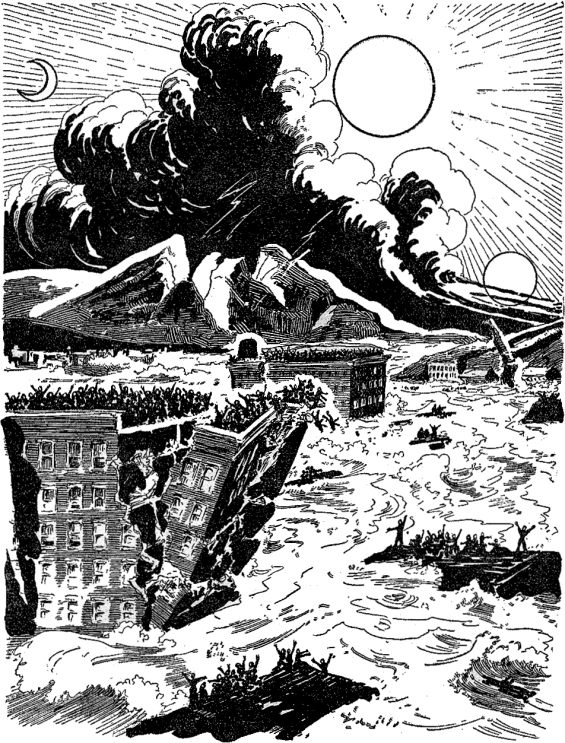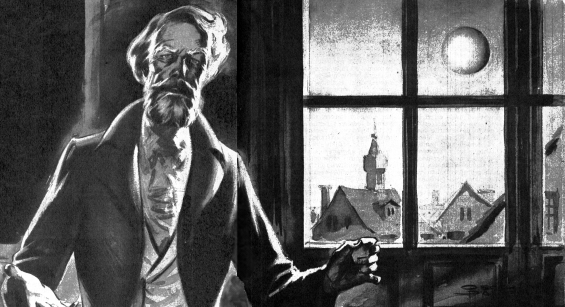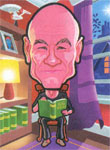
 It seems LibriVox has started adding a few more credits to its collections starting with this volume. Besides the narrators, this collection was created by the following LibriVox volunteers:
It seems LibriVox has started adding a few more credits to its collections starting with this volume. Besides the narrators, this collection was created by the following LibriVox volunteers:
Book Coordinator: Gregg Margarite
Dedicated Proof-Listener: julicarter
Meta-Coordinator/Cataloging: Lucy Burgoyne
Stories new to this collection include:
Stopover by William Gerken. This is a well written but annoying story. It is one of better parapsychology short stories, but that isn’t saying much. John W. Campbell was absolutely obsessed with paraspychological ESP bunk – it makes for very repetitive reading. This story’s setting, in a post-apocalyptic USA, is vivid – and the characters are emotionally realistic -too bad about the ESP crap. Bellona Times, the narrator, has a few missteps in this one – including the reading “psi talents” as “pee-ess-eye talents.”
Something Will Turn Up by David Mason. The beatnik/hippy repairman, and his dialogue, in this tale are a real hoot. It’s more a Fantasy tale than an SF one, but its got a beatnik TV repairman so I’m still happy. Read by Bellona Times again without any serious flaws but with a few little ones here and there. Times snaps his fingers and whistles – which to me is a narrator double no-no. There’s also a word or two improperly read, notably “reversed” read as “reverse.”
The Sargasso Of Space by Edmond Hamilton. This is a fast paced space opera (and mystery) about an interplanetary spacecraft that’s run out of gas. Gregg Margarite continues to kick ass as a narrator. He’s no vocal chameleon but he’s just a few tweaks away from being a pro sounding narrator. He seems to choose some of the better stories too. I think he’s super cool. Maybe he’ll be my friend? That’d be cool.
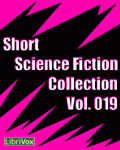 Short Science Fiction Stories Vol. 19
Short Science Fiction Stories Vol. 19
By various; Read by various
10 Zipped MP3 Files or Podcast – Approx. 4 Hours 41 Minutes [UNABRIDGED]
Publisher: LibriVox.org
Published: June 23, 2009
Science Fiction is speculative literature that generally explores the consequences of ideas which are roughly consistent with nature and scientific method, but are not facts of the author’s contemporary world. The stories often represent philosophical thought experiments presented in entertaining ways. Protagonists typically “think” rather than “shoot” their way out of problems, but the definition is flexible because there are no limits on an author’s imagination. The reader-selected stories presented here were written prior to 1962 and became US public domain texts when their copyrights expired.
Podcast feed:
http://librivox.org/bookfeeds/short-science-fiction-collection-19.xml
iTunes 1-Click |SUBSCRIBE|
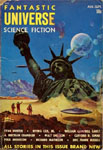 All Cats are Gray
All Cats are Gray
By Andre Norton; Read by Gregg Margarite
1 |MP3| – Approx. 16 Minutes [UNABRIDGED]
Publisher: LibriVox.org
Published: June 23, 2009
An odd story, made up of oddly assorted elements that include a man, a woman, a black cat, a treasure—and an invisible being that had to be seen to be believed. – Under normal conditions a whole person has a decided advantage over a handicapped one. But out in deep space the normal may be reversed—for humans at any rate. First published using Norton’s Andrew North pseudonym in Fantastic Universe Science Fiction, August–September 1953.
 Beyond Lies The Wub
Beyond Lies The Wub
By Phillip K. Dick; Read by Tom Hackett
1 |MP3| – Approx. 16 Minutes [UNABRIDGED]
Publisher: LibriVox.org
Published: June 23, 2009
The slovenly wub might well have said: Many men talk like philosophers and live like fools. From Planet Stories July 1952.
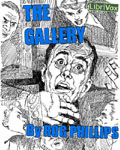 The Gallery
The Gallery
By Rog Phillips; Read by Ted Ryan
– [UNABRIDGED]
Publisher: LibriVox.org
Published: June 23, 2009
Wherever he went Arthur felt the power behind the lens. – Aunt Matilda needed him desperately, but when he arrived she did not want him and neither did anyone else in his home town. From Amazing Stories January 1959.
 The Happy Unfortunate
The Happy Unfortunate
By Robert Silverberg; Read by Gregg Margarite
1 |MP3| – Approx. 39 Minutes [UNABRIDGED]
Publisher: LibriVox.org
Published: June 23, 2009
Dekker, back from space, found great physical changes in the people of Earth; changes that would have horrified him five years before. But now, he wanted to be like the rest—even if he had to lose an eye and both ears to do it. From Amazing Stories December 1957.
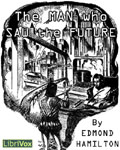 The Man Who Saw The Future
The Man Who Saw The Future
By Edmond Hamilton; Read by Xanderphilips
1 |MP3| – Approx. [UNABRIDGED]
Publisher: LibriVox.org
Published: June 23, 2009
“Jean de Marselait, Inquisitor Extraordinary of the King of France, raised his head from the parchments that littered the crude desk at which he sat. His glance shifted along the long stone-walled, torchlit room to the file of mail-clad soldiers who stood like steel statues by its door. A word from him and two of them sprang forward.” First published in Amazing Stories, October 1930. Later reprinted in the February 1961 issue of Amazing Stories.
 A Matter Of Proportion
A Matter Of Proportion
By Anne Walker; Read by Dale A. Bade
1 |MP3| – Approx. 37 Minutes [UNABRIDGED]
Publisher: LibriVox.org
Published: June 23, 2009
In order to make a man stop, you must convince him that it’s impossible to go on. Some people, though, just can’t be convinced. From Astounding Science Fiction August 1959.
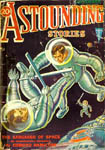 Sargasso Of Space
Sargasso Of Space
By Edmond Hamilton; Read by Greg Margarite
1 |MP3| – Approx. 50 Minutes [UNABRIDGED]
Publisher: LibriVox.org
Published: June 23, 2009
She was floating along the wreck-pack’s edge. Helpless, doomed, into the graveyard of space floats the wrecked freighter Pallas. From Astounding Stories September 1931.
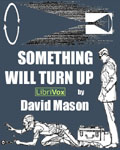 Something Will Turn Up
Something Will Turn Up
By David Mason; Read by Bellona Times
1 |MP3| – Approx. 17 Minutes [UNABRIDGED]
Publisher: LibriVox.org
Published: June 23, 2009
Err … maybe it had to do with this being a non-Parity universe, perhaps? Some things can’t be simply inverted, after all… From Analog February 1963.
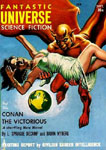 Stopover
Stopover
By William Gerken; Read by Bellona Times
1 |MP3| – Approx. 23 Minutes [UNABRIDGED]
Publisher: LibriVox.org
Published: June 23, 2009
What will the world be like, the day after Tomorrow, for the lonely ones who will have talents that others will half fear, half envy? William Gerken describes this strange world in which young and old will have to find new values and pursue new dreams, as they search for the answer… From Fantastic Universe September 1957.
 Toy Shop
Toy Shop
By Harry Harrison; Read by Xanderphillips
1 |MP3| – Approx. 10 Minutes [UNABRIDGED]
Publisher: LibriVox.org
Published: June 23, 2009
The gadget was strictly, beyond any question, a toy. Not a real, workable device. Except for the way it could work under a man’s mental skin… From Analog April 1962.
Posted by Jesse Willis


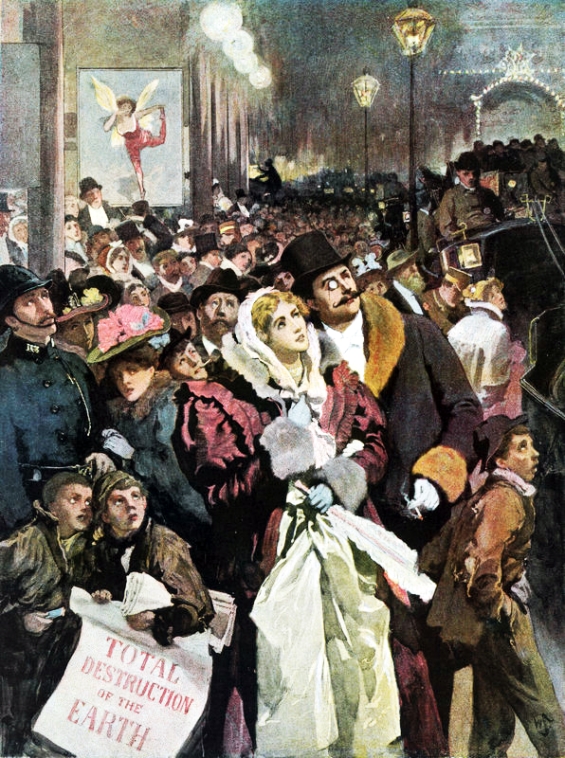
 The Star
The Star The Star
The Star The Star
The Star The Star
The Star